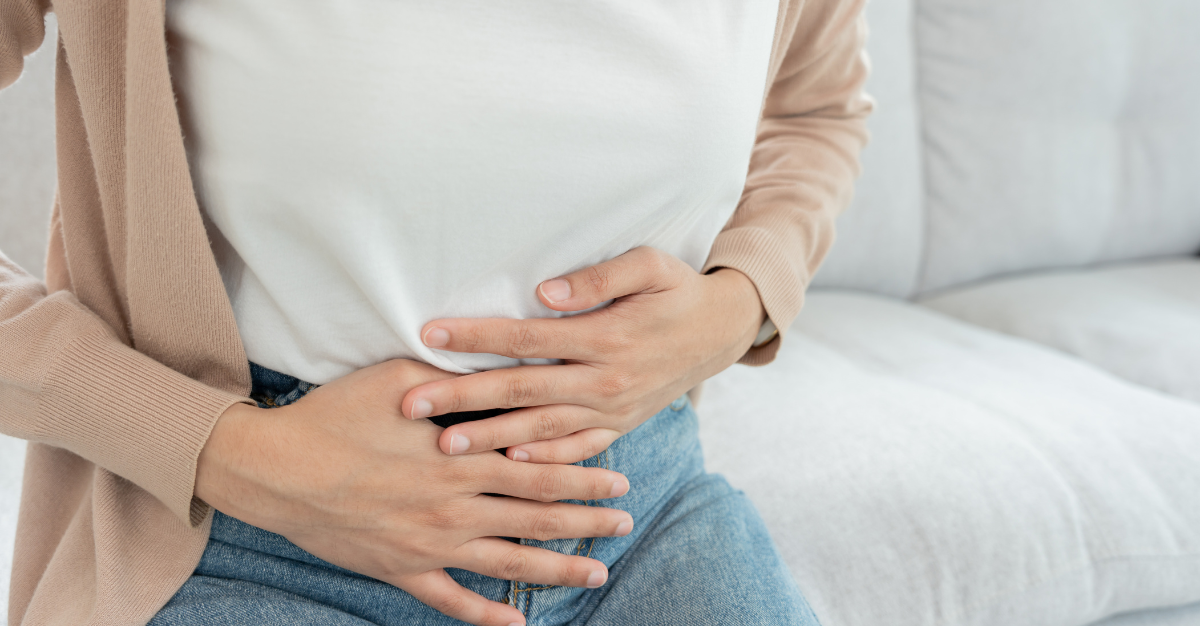When the going gets hard, we experience constipation. Although it’s not a fun subject, it’s one of the most common gastrointestinal complaints in healthcare practices. We may all experience constipation at some point, and certain conditions make it more likely to occur. In fact, after the age of 60, about 33% of people experience constipation.
Struggling with chronic constipation can have far-reaching effects on your health. Beyond discomfort, constipation can lead to issues like bloating and abdominal pain and can even impact your energy levels and overall mood. For those managing conditions such as diabetes or IBS, optimal gut health is crucial for maintaining balance and well-being.
Managing constipation can be tricky. Conventional treatments, like laxatives, can provide temporary relief but may worsen symptoms over time. Relying on these treatments can lead to dependency, where your body no longer functions naturally to regulate bowel movements. As your body starts to rely on those treatments to have a bowel movement, it doesn’t truly treat the root cause of your constipation. A more holistic approach that identifies the cause and introduces easily implemented lifestyle changes will yield better results.
What Is Constipation?
The definition of constipation varies by person, as we all have different digestive routines. As a general rule, constipation is characterized by:
- Small, hard stools.
- Having a bowel movement fewer than three times a week.
- Bloating and discomfort.
- Having to strain on the toilet.
- Feeling like you still have to poop after you go.
What Causes Constipation?
Stool travels through your large intestine, propelled by rhythmic muscle contractions known as peristalsis, and is primarily composed of water, undigested fiber, bacteria, and dietary fat. Without the correct balance of water and fiber, stool can become harder and more difficult to pass. This also happens if it sits too long in the colon.
Here are some common causes of constipation and a few you may not have even considered:
- Dehydration is a common cause of constipation, with even fairly mild dehydration having an impact. To avoid constipation, keep up with your recommended water intake. One reason some people struggle with constipation when they travel is because they’re more likely to be dehydrated.
- Poor diet is also a major factor, particularly when it comes to fiber intake. If you’re not getting enough fiber, you’re more likely to become constipated. However, some people experience constipation with too much fiber if it’s not increased carefully. Many people find that overindulging in low-fiber foods like cheese and chocolate results in constipation.
- Thyroid disorders are often characterized by an increase in constipation since thyroid hormone influences your metabolism and bowel motility. When thyroid hormone levels are low, as in hypothyroidism, the digestive system slows down, leading to less frequent and more difficult bowel movements. Addressing thyroid health can be a crucial step in managing chronic constipation.
- Hormonal shifts can affect constipation, with menopausal women often experiencing difficulties. Interestingly, one recent study found a link between frequent constipation and more severe menopausal symptoms.
- Pregnancy frequently triggers constipation, with up to 38% of pregnant women experiencing slower bowel movements. The hormonal changes of pregnancy contribute to this, as well as decreased activity levels and supplements containing iron that are often taken during pregnancy.
- Other supplements and medications that can contribute to constipation include painkillers, particularly opioids, antidepressants, and antacid treatments. Paradoxically, laxatives can also contribute to constipation since your body can develop a dependency.
- Inactivity is another culprit. Not only does regular exercise stimulate your digestive system, but good muscle tone in your abdomen helps with bowel movements. If you’re not moving, your digestive system isn’t moving either! Many people experience constipation if they suddenly don’t get as much exercise as they usually do.
- Certain medical conditions can lead to constipation, including Parkinson’s and diabetes. Issues with the digestive system, like irritable bowel syndrome and diverticulosis, often feature alternating bouts of constipation and diarrhea.
- Changes to your routine can also trigger constipation. Your body gets used to certain triggers for a bowel movement, like a cup of coffee. Disrupting that routine, or even pooping in a new setting, can trigger constipation.
- Stress is another factor in constipation. Your mood and your digestion impact each other in complex ways. For some people, chronic stress slows digestion, ultimately leading to constipation.
Constipation Relief Through Dietary Adjustments
Instead of turning to medication for constipation, start by making adjustments to your diet. Here are some proven solutions to get things moving.
- Increase Fiber Intake. You should be getting at least 22 grams of fiber per day, preferably a mix of insoluble and soluble fiber.
- Insoluble fiber doesn’t dissolve in water. It moves through your digestive system unchanged, which can help add bulk and increase the frequency of your stools.
- Soluble fiber, on the other hand, absorbs water to form a gel-like substance, which can help soften your stool.
- Many high-fiber foods contain a mixture of both types of fiber. Good sources of insoluble fiber include fruits, nuts and seeds, vegetables, wheat bran, and whole grains. Soluble fiber is found in fruits, vegetables, oats, and barley. If you’re used to a low-fiber diet, be sure to increase fiber content gradually to make the transition easier on your system.
- Some foods that are particularly effective for constipation include:
- Apples: This fruit is not only high in fiber, but it also contains pectin, which can act to soften stool and increase frequency.
- Prunes: A time-honored cure for constipation because of their high fiber content, prunes also contain the natural sugar sorbitol, which has a laxative effect.
- Kiwis: Several studies confirm that the many benefits of eating kiwis include constipation relief.
- Sweet potatoes. This versatile veggie is high in both insoluble fiber and pectin.
- Leafy greens. Most varieties of leafy greens are high in fiber. Try to choose darker greens, such as spinach or kale, instead of iceberg lettuce, to improve your fiber intake.
- Beans and lentils. Replacing meat with legumes in some meals goes a long way to increase your fiber intake!
- Flax and chia seeds: Sprinkling flax seeds on meals is an easy way to increase your fiber. Chia seeds are particularly high in soluble fiber, so a chia seed pudding is much better for digestion than many other desserts.
- Stay Hydrated. Increasing fiber will also lead to problems if you’re not also increasing your water intake. To increase water consumption, many people find it useful to carry a non-toxic water bottle with them throughout the day. Adding slices of lemon or cucumber can make water more appealing if you’re not a regular water drinker. Remember to increase your water intake when it’s hotter outside, or if exercising.
- Caffeine and alcohol are both diuretics, which means they can contribute to dehydration. It’s best to limit both, and alternate with water when you do drink them.
- Focus on Probiotics. Your gut contains a complex microbiome of bacteria, which plays an important role in digestion and overall well-being. Probiotics are live, beneficial bacteria that support that microbiome. They’re naturally present in fermented foods like kombucha, kefir, sauerkraut, and tempeh.
- You can also purchase probiotic supplements. Several studies have found that probiotic supplements are particularly useful for constipation caused by medication or supplements, such as iron supplements. There is a broad range in quality and effectiveness when it comes to probiotic supplements, so it’s good to work with a healthcare practitioner to find the right type and dose for you.
Practical Lifestyle Tips for Better Bowel Movements
- Regular Exercise. Regular exercise is a key part of fending off constipation. It doesn’t have to be vigorous exercise – a simple routine of about 30 minutes of moderate exercise will do the trick. In fact, some people find extremely hard workouts lead to constipation.
- Several yoga poses can help with constipation, including twisting poses or poses like “wind-relieving pose” and “happy baby.” Building core strength through yoga and pilates can also help digestion.
- Reduce Stress. If you suspect stress is contributing to constipation, try to get to the root of the stress in your life. Although we can’t always eliminate stress, we can find positive ways to cope with it, including meditation, exercise, and talk therapy.
Seek Help for Gut Health and Hormonal Balance
Functional Medicine practitioners can run tests to determine what’s really going on in your gut. Imbalances can be hard to manage on your own if you don’t know what they are. Tests can also identify imbalances in thyroid hormone levels, as well as estrogen and other hormones that impact digestion. From there, we can work together to create a plan tailored to your unique body. By addressing underlying issues and implementing personalized treatment plans, you can achieve lasting relief and improve your overall well-being.
You don’t have to suffer through constipation or loose stools; you deserve perfect poos every day! Together, we can identify the causes and work to get you feeling better! Don’t hesitate to reach out to us to start your journey toward better gut health and hormone balance today.
Sources
Yurtdaş G, Acar-Tek N, Akbulut G, Cemali Ö, Arslan N, Beyaz Coşkun A, Zengin FH. Risk Factors for Constipation in Adults: A Cross-Sectional Study. J Am Coll Nutr. 2020 Nov-Dec;39(8):713-719. doi: 10.1080/07315724.2020.1727380. Epub 2020 Feb 20. PMID: 32077808.
Yurtdaş G, Acar-Tek N, Akbulut G, Cemali Ö, Arslan N, Beyaz Coşkun A, Zengin FH. Risk Factors for Constipation in Adults: A Cross-Sectional Study. J Am Coll Nutr. 2020 Nov-Dec;39(8):713-719. doi: 10.1080/07315724.2020.1727380. Epub 2020 Feb 20. PMID: 32077808.
Trottier M, Erebara A, Bozzo P. Treating constipation during pregnancy. Can Fam Physician. 2012 Aug;58(8):836-8. PMID: 22893333; PMCID: PMC3418980.
van der Schoot A, Drysdale C, Whelan K, Dimidi E. The Effect of Fiber Supplementation on Chronic Constipation in Adults: An Updated Systematic Review and Meta-Analysis of Randomized Controlled Trials. Am J Clin Nutr. 2022 Oct 6;116(4):953-969. doi: 10.1093/ajcn/nqac184. PMID: 35816465; PMCID: PMC9535527.
Richardson DP, Ansell J, Drummond LN. The nutritional and health attributes of kiwifruit: a review. Eur J Nutr. 2018 Dec;57(8):2659-2676. doi: 10.1007/s00394-018-1627-z. Epub 2018 Feb 22. PMID: 29470689; PMCID: PMC6267416.
Shreiner AB, Kao JY, Young VB. The gut microbiome in health and in disease. Curr Opin Gastroenterol. 2015 Jan;31(1):69-75. doi: 10.1097/MOG.0000000000000139. PMID: 25394236; PMCID: PMC4290017.
Shree Ganesh HR, Subramanya P, Rao M R, Udupa V. Role of yoga therapy in improving digestive health and quality of sleep in an elderly population: A randomized controlled trial. J Bodyw Mov Ther. 2021 Jul;27:692-697. doi: 10.1016/j.jbmt.2021.04.012. Epub 2021 Apr 22. PMID: 34391308.
Suzuki N, Murakoshi M, Ono T, Morishita S, Koide M, Bae MJ, Totsuka M, Shimizu M, Sugiyama K, Nishino H, Iida N. Effects of Enteric-coated Lactoferrin Tablets Containing Lactobacillus brevis subsp. coagulans on Fecal Properties, Defecation Frequency and Intestinal Microbiota of Japanese Women with a Tendency for Constipation: a Randomized Placebo-controlled Crossover Study. Biosci Microbiota Food Health. 2013;32(1):13-21. doi: 10.12938/bmfh.32.13. Epub 2013 Jan 31. PMID: 24936358; PMCID: PMC4034292.




